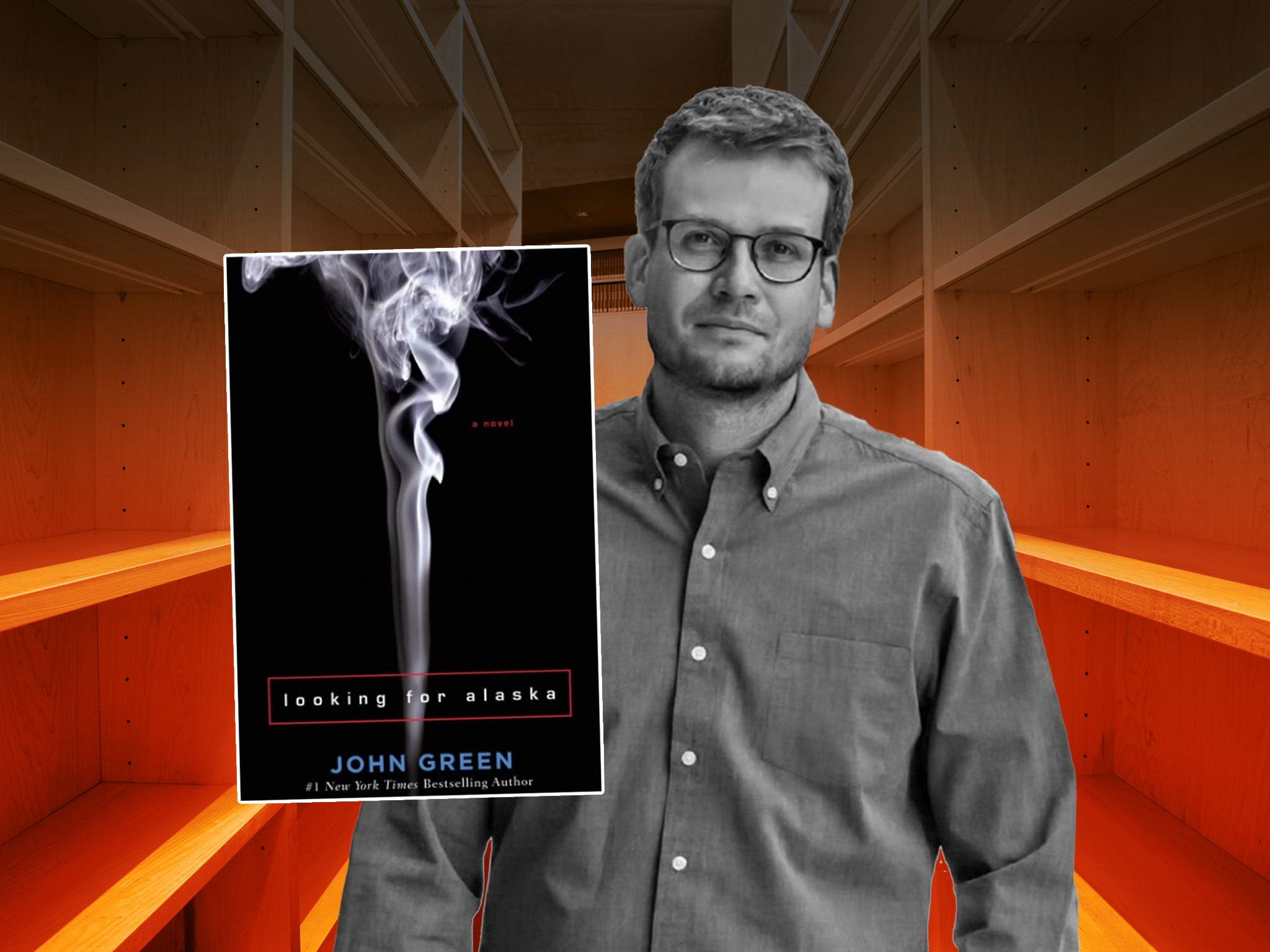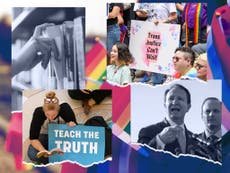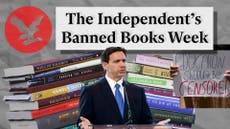John Green on book bans, bad faith, and the ‘history of folks trying to control what other folks can read’
‘Looking For Alaska’, Green’s 2005 debut, has been a target of book banning efforts for at least 15 years. Clémence Michallon speaks to the author about America’s history of censorship, the need to trust young readers, and more


Your support helps us to tell the story
From reproductive rights to climate change to Big Tech, The Independent is on the ground when the story is developing. Whether it's investigating the financials of Elon Musk's pro-Trump PAC or producing our latest documentary, 'The A Word', which shines a light on the American women fighting for reproductive rights, we know how important it is to parse out the facts from the messaging.
At such a critical moment in US history, we need reporters on the ground. Your donation allows us to keep sending journalists to speak to both sides of the story.
The Independent is trusted by Americans across the entire political spectrum. And unlike many other quality news outlets, we choose not to lock Americans out of our reporting and analysis with paywalls. We believe quality journalism should be available to everyone, paid for by those who can afford it.
Your support makes all the difference.Back in 2008, author John Green filmed a YouTube video titled “I Am Not A Pornographer.” In it, he discussed his debut novel Looking For Alaska, which had been out for three years. A high school outside of Buffalo, New York, was planning to teach it to 11th-graders as part of an English class. As Green explained, “because there are a few scenes in Looking For Alaska that some people find controversial,” school administrators and teachers gave parents a choice: they could agree with their child being taught the book, or they could ask for their child to read a different book.
“But there were a few people who weren’t happy with this solution,” Green said in the clip. “These people didn’t actually have kids in the 11th grade, but no matter. They think that my book is pornographic, and that it will cause immoral thoughts and actions in children. These people believe that no one should be allowed to read the book, even those people whose parents signed the permission slip.”
Fifteen years after its publication, Green’s video remains eerily relevant. Not only did Looking For Alaska become a regular feature on lists of most challenged books across US schools, but book bans have now reached a record high. In 2022, the American Library Association (ALA) documented the highest number of attempted book bans (1,269 demands to censor library books and resources in 2022) since it began compiling data more than 20 years ago. Recent challenges have targeted books featuring LGBT+ characters, or discussing racism, with frequency. As for Looking For Alaska, which was originally published in 2005, it appeared on the association’s top 10 most challenged books in 2012, 2013, 2015, 2016, and, most recently, 2022.
In his 2008 video, Green said that “it pisses me off when small groups of well-organized would-be book banners try to take over America’s public school systems.” During a phone call with Green in March, I bring up the clip, and this particular observation.
“Little did I know how organized those groups would become in their attempts to take over America’s school systems,” Green tells The Independent. The freedom to read, he says, and the ability for librarians and teachers to do their jobs, are “essential to the American education system, but it’s also only one piece of what’s happening now.”
“There are attempts not just to ban books, but to ban entire subjects from high school curricula,” he says. “There are attempts to rewrite American history to better fit contemporary narratives around America’s purported greatness.”
Looking For Alaska tells the story of Miles, a teenage boy who leaves his Florida home to – as he puts it, citing the French Renaissance writer François Rabelais – seek a Great Perhaps. He does so at a boarding school in Alabama, where he meets the intriguing Alaska Young. It’s a coming-of-age story, tackling loss, forgiveness, and uncertainty. It also happens to feature one scene in which Miles receives oral sex from a friend called Lara. The scene is a couple of pages long and goes into some anatomical detail. A few pages later, Miles kisses the elusive Alaska; the scene involves less physical contact but far more emotional value.
This, as Green has explained multiple times over the past 15 years, is the point of the two juxtaposed scenes. “The argument here,” he said in his 2008 video, “is that physical intimacy can never stand in for emotional closeness.”
Yet, the idea that Looking For Alaska is “sexually explicit” is listed underneath all four of the book’s appearances on the ALA’s top 10 most challenged books in a given year. In 2016, the book was challenged because of “a sexually explicit scene that may lead a student to ‘sexual experimentation.’”
It’s hard to reconcile those interpretations with the book’s context, or indeed, with any good-faith reading of it. Outside of conversations on book banning, Looking For Alaska is simply not a novel remembered for its sex scene. Online, readers of the book most frequently exalt its emotional impact, and its exploration of death, grief, and the limits of how we perceive one another.
“It's always a bummer to have your work read in bad faith,” Green says during our call. “It’s always a bummer when people read your work to find out what they hate about it, because that's not, of course, why anyone writes.”
Having this specific passage read out of context, he adds, is “especially troubling,” because “removed from its context, it can’t do its work – which is to point out that the romantic encounter that Miles and Lara have is awkward and unfulfilling, precisely because they don’t have the emotional connection they need to have a fulfilling romantic encounter.”
“Reading that passage out of context in a school board meeting essentially makes it sound like the scene is the exact opposite of what it is,” he says. “It’s really exhausting, to have people hate your book, but not read it, which is generally what’s happening here. Generally, they're reading that scene, or a few other scenes that have been highlighted on websites that are used to help these folks organize, and they're not reading the novel, which is, of course, not about sex.”
The fact that Looking For Alaska is a young adult novel further poisons the well: underneath every claim that the book doesn’t belong on young readers’ shelves is the suggestion that teenage readers will be indiscriminately influenced by its content, and blind to its nuances.
“I think there’s a certain amount of condescension toward teen readers in all of this – that somehow we must protect them because they don’t have the intellectual sophistication or nuance to understand what the point of a scene is and can only take everything literally,” Green says on our call. “But that’s, of course, ludicrous. Kids do not read Animal Farm and think, ‘We really need to get rid of all these pigs, they’re revolutionaries.’ They think, ‘Ah, this is a metaphor.’”
Young people, he admits, “may not read the same way that adults do, but they do read with nuance and sophistication.” He has been able to witness this firsthand, he says, because Looking For Alaska has been in print for 18 years. He has been able to hear from people, now grown, who read the book as teenagers and have since shared their impressions with him – “and they generally did not find it pornographic.”
Green has gone on to write four more novels (plus the 2010 Will Grayson, Will Grayson, co-authored with David Levithan), including the 2012 blockbuster The Fault in Our Stars, as well as the 2021 essay collection The Anthropocene Reviewed. He continued talking about the banning of Looking For Alaska, in another YouTube video in 2016, and recently on TikTok, where in September 2022, he discussed efforts to ban the book in his own former school district.
Efforts to ban Green’s work have now existed in the background of his writing life for 15 years. When much of the work of being a writer involves learning to trust your reader, and getting over the fear of being misunderstood, how has this played out for Green? Has it affected his craft at all? Is it something he’s had to learn to set aside when sitting down to write?
“You do have to assume the good faith of a reader, and try not to write defensively,” he tells The Independent. He’s had periods of writing defensively, but he thinks those came more after the publication of The Fault in Our Stars, partly due to the overwhelming response it received. (It was released at the top of The New York Times Best Seller list in its category, remained there for seven consecutive weeks, and as of 2017, had sold 23 million copies worldwide.)
Green adds: “I think I have written defensively before, and I’ve had to work my way out of it. I think that’s one of the reasons why it was a long time between The Fault in Our Stars and [the 2017 novel] Turtles All the Way Down. I had to figure out what to do about the fact that the reading of my books is just different now.”
While he has been discussing book banning for most of his publishing career, Green doesn’t view Looking For Alaska as the canary in the coal mine of our current moment. He invokes Judy Blume, whose work, including the novels Forever and Deenie, have faced similar challenges, and who has been “a relentless advocate for intellectual freedom for five or six decades now.”
Green also brings up Kurt Vonnegut, whose novel Slaughterhouse-Five has been a frequent target of banning efforts. In 1973, he famously wrote to a school board chairman who had demanded that all of his school’s copies of the book be burned in a furnace: “Certain members of your community have suggested that my work is evil. This is extraordinarily insulting to me. The news from [Drake High School, North Dakota] indicates to me that books and writers are very unreal to you people. I am writing this letter to let you know how real I am.”
“I don’t see Alaska as the beginning of anything,” Green says. “I see it as part of a much longer history of folks trying to control what other folks can read.”
In October 2022, Green shared a TikTok video in which he said he had heard from a school librarian telling him they had to pull all of his books and dozens of others from their shelves, because the school board had moved to ban more than 100 books from the library. “And that school board was elected by voting,” Green said. The effect of the clip was twofold: in it, Green urged his viewers to register to vote, while also highlighting the effects of book bans on librarians trying to do their jobs.
“From what I’ve heard from people, there are a number of ways it impacts their work,” Green says during our call. “First, it takes a tremendous amount of time and energy away from the actual work of librarianship – building a great collection, getting the right books to the right kids, and supporting kids in their efforts to learn about the world.” For a lot of people, he adds, book bans can be career-threatening. “I’ve heard from a lot of librarians who have to make choices that are extremely difficult,” he says. “And I don’t know the choices that I would make between trying to find a way to keep their jobs and trying to find a way to perform their work in keeping with their beliefs about librarianship. I think it’s really difficult.”
Authors, he says, are “often lifted up as the heroes of these stories” whenever book bans are discussed. “But the truth is that I have very little on the line, and librarians and teachers have so much on the line. They are the folks who are really standing up for intellectual freedom every day.”
One of the main groups behind recent book challenges is Moms For Liberty, a conservative nonprofit headquartered in Florida. The name feels “very surreal and Orwellian” to Green, with its suggestion that “the apparent liberty is the liberty to choose what other people’s kids read”, which is “way out of line with my understanding of liberty.” As a parent of two himself, Green says he takes interest in what his children read in school, and loves to read the books they’re assigned.
“But I’m not a teacher,” he says. “I’m not an expert, and I don’t think it’s my job to tell the experts who teach my kids which books they should be assigning. So I read the books along with my kids whenever I can, and I enjoy them and appreciate them. I see my role as trusting the teachers, working with my kids’ teachers, and learning from them.”
To Green, there is a great irony at the heart of this “relentless focus on book banning”: “The internet is this completely unregulated space.” He would know: in addition to his work as a novelist, Green has been a steady online presence since 2007, when he and his brother Hank started trading videos on a YouTube channel that now has 3.5 million subscribers. Together, they have also launched Crash Course, another YouTube channel dedicated entirely to educational videos, which has attracted 14.6 million subscribers.
In a world where “small groups of well-organized would-be book banners” only seem better organized now than they were in 2008, Green views the internet as a source of hope, as well as a way to access knowledge and, yes, books.
“When my dad first brought home the internet in 1992, I remember the first two things he said to me,” Green says. “He was like, ‘This is gonna change the world.’ And I said, ‘What? Why is it gonna change the world?’ And he said, ‘You can look up the weather in Dubai right now.’ And I was like, ‘That is very boring.’ And then he said, ‘You can read [Plato’s] The Apology of Socrates for free anytime you want at home.’ And I said, ‘That is also very boring.’ But he glimpsed the future.”
And so, to young readers whose schools might be wrestling with their own book banning efforts, Green says: “Read broadly, and read boldly.”




